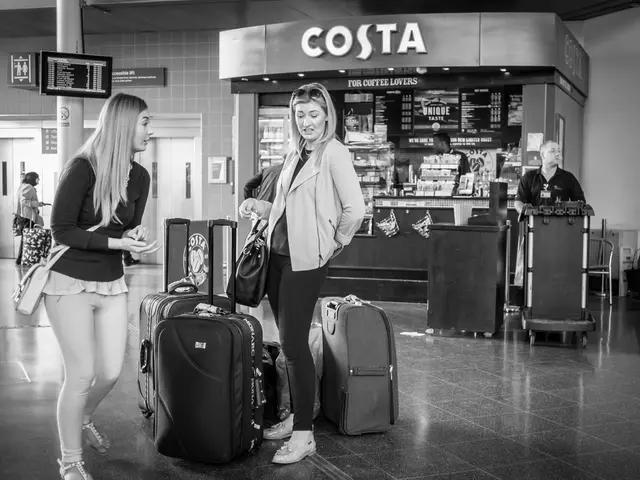Pope Race, Day Two: Can a German Cardinal Sort Out the Vatican's Bankruptcy?
Potential Financial Troubles in the Vatican Could Lead to the Selection of a Pope from Germany
Gone are the days when German cardinals seemed unlikely for the Holy See. Some say an Italian or a Filipino might take the top spot, but the British BBC is throwing a German into the mix: Munich Archbishop Reinhard Marx is reportedly a contender. Will we have a German Pope?
The reason for Marx's potential rise to fame: he's known for his financial prowess. Marx serves as the coordinator of the Vatican's economic council and recently presented the papal budget—numbers that are said to be disastrous. The deficit for the Holy See has grown significantly over the years, estimated to be around €87 million in 2024. Even with substantial cuts, the problem remains unsolvable, according to an unnamed cardinal cited by the Italian "La Repubblica": "It would take a miracle."
The Papal Power List: Can a German Cardinal Save the Vatican's Finances?
But things look rosier in Germany. Many consider Marx's diocese—the Archdiocese of Munich-Freising—as one of the wealthiest in the country. The balance sheet for 2023 shows a surplus of €19 million, with assets of nearly €4 billion. Although this is less than the previous year, it's still impressive during declining church tax revenues. Along with his influence as a former chairman of the German Bishop's Conference and advisor to Pope Francis, Marx's financial management skills make him a strong contender. But how financially stable are the other 26 German dioceses?
Churches aren't legally obligated to disclose their finances, even if they receive public funds. After a series of financial scandals in the Dioceses of Limburg and Freiburg, the Bishop's Conference has pledged to be more transparent, committing to adopting commercial accounting and annual audits and reports. Churches in Germany enjoy certain tax privileges as corporations under public law, allowing them to avoid corporation tax and trade tax.
Fortunes Fluctuate: Not All Dioceses Are Profitable
The main source of income for the dioceses is the church tax, supplemented by donations and investments in stocks and real estate funds. The dioceses are also investors, with holdings in companies like the Aachener Siedlungs- und Wohnungsgesellschaft, which owns properties across Germany, including prime locations like Munich's Stachus and Berlin's Ku’damm. The dioceses of Cologne, Paderborn, Trier, Münster, Essen, and Aachen own 100% of this company, according to the commercial register.
A few dioceses stand out as particularly wealthy, with the Diocese of Paderborn topping the list with a total capital of over €7 billion in 2020. The Archdiocese of Cologne reported €2.8 billion in equity and made a profit of around €5 million in 2023, while its assets were worth about €3.35 billion ten years ago, according to media reports.
However, not all dioceses are thriving. The Diocese of Dresden-Meißen reported a loss of over €2 million in 2022, and subsidies to the eastern dioceses from the west have been reduced and are set to end in 2024. Bishop Timmerevers of Dresden-Meißen stated in 2023 that his diocese would need to manage with fewer financial resources in the future.
The varying and opaque figures are partly due to the difficulty in determining the total wealth of the dioceses, as the Church's charitable organizations, religious orders, and institutions also have their own budgets and assets, particularly real estate owned by local parishes. The value of the Church's real estate, some of which has been in its possession for centuries, is also uncertain, with famous examples like Cologne Cathedral valued only at €27—a symbolic value representing each plot of land on which the cathedral stands, plus one euro for the entire building.
The Church's Hidden Wealth: Unveiling the Value of Religious Assets
Political scientist and church critic Carsten Frerk attempted to calculate the total value of the Catholic Church's real estate, investments, and holdings about 20 years ago, estimating it at around €270 billion.[4] However, precise figures for the Church's wealth are difficult to determine.
In the coming years, the dioceses expect declining church tax revenues due to increasing secularization and growing numbers of church exits, some of which may be related to the church tax system itself. In Munich-Freising alone, church tax revenues decreased by €41 million in 2023.
With the Catholic Church's financial situation on the line, is Archbishop Reinhard Marx the papal champion we need to balance the Holy See's books and guide the Church into more prosperous times? Time will tell as the cardinals make their decision.
- The papal race continues, with the British BBC suggesting German Cardinal Reinhard Marx as a potential Pope, given his expertise in financial policy and management.
- As the coordinator of the Vatican's economic council and proposer of the papal budget, Marx's financial prowess is undeniable, despite the Holy See's mounting deficit.
- The Church in Germany, however, appears comparatively stable, with many dioceses maintaining considerable wealth, such as the Archdiocese of Munich-Freising, which showed a surplus of €19 million in 2023.
- Churches in Germany, including dioceses, earn their main income from church taxes, supplemented by donations and investments in stocks, real estate funds, and companies like the Aachener Siedlungs- und Wohnungsgesellschaft.
- Some dioceses are particularly wealthy, like Paderborn, with a total capital of over €7 billion in 2020, while others, such as Dresden-Meißen, reported a loss of over €2 million in 2022.
- The Catholic Church's wealth is not just limited to dioceses; charitable organizations, religious orders, and local parishes also have their budgets and assets, particularly real estate, contributing to the Church's overall wealth, which remains difficult to determine precisely.








